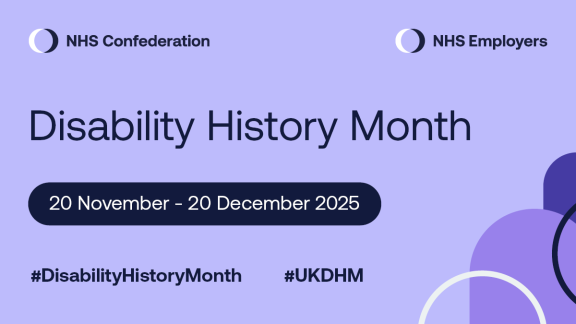The mental health of disabled staff

Mental ill health can be a form of disability. However, those who have lived experience of a physical or non-visible long-term condition may also experience mental ill health. This may sometimes be related to that physical disability or long-term condition or it can be unrelated.
1 in 4 people will experience a mental health problem of some kind each year in England. Under the Equality Act 2010, a mental health condition is considered a disability if it has a long-term effect on a person’s normal day-to-day activity. Our mental wellbeing infographic provides a range of up-to-date key statistics and facts about mental wellbeing in the workplace. High levels of stigma mean that mental ill health is often hidden.
Additional pressures on disabled staff
There are some specific personal and individualised stresses and pressures that being disabled can bring. People with a disability are more likely to experience a mental health condition. This may be a result of the discrimination, bullying and harassment that they may have experienced. Day-to-day management of a disability can also be tiring, overwhelming and can impact a disabled person’s mental health.
In the 2022 NHS Workforce Disability Equality Standard (WDES) report, one third of disabled staff reported having experienced bullying, harassment or abuse from patients, service users or the public. Around a fifth stated experiencing this from managers and one quarter from colleagues. This is notably higher than that experienced by non-disabled staff.
Disability discrimination can lead to mental health issues. We know from the 2022 WDES report that disabled staff are twice as likely to enter the formal capability process as their non-disabled colleagues. Research by Scope supports this as it found that 72 per cent of disabled people have experienced negative attitudes or behaviour in the last five years.
The WDES report also shows us that presenteeism for disabled staff is significantly higher than that of non-disabled staff. This signifies the pressure disabled staff feel to attend work when feeling unwell and this can contribute to poor mental health.
How employment can help improve mental health
Gaining or being able to remain in employment can be transformational in helping people to reach their full potential and improve their mental health and wellbeing. The Learning Disability Employment Programme supports the employment of people with a learning disability and/or autism in the NHS. There are also benefits for employers, including reduced employee turnover, accessing a larger talent pool and nurturing an inclusive and accessible organisation.
How to support disabled staff with mental ill health
We support the social model of disability. This sets out that people are disabled by barriers in society that discriminate against them, not by their impairment or difference. These can be physical barriers such as inaccessible buildings, but they can also be social barriers, like stereotypical attitudes and prejudice. Making workplace adjustments can help staff to feel more valued in their work and support them to work towards their career aspirations. Removing these barriers removes some of the pressure on disabled staff to manage their conditions and can also support their mental wellbeing.
It can be helpful to think about mental health through an intersectional lens to support the disabled staff in our workplaces. Often, small but targeted changes such as a meaningful health and wellbeing conversation can have a big impact on the working lives of disabled staff.
Find out how Cambridgeshire and Peterborough NHS Foundation Trust created a rapid-access mental health service to support its staff.
Top tips for employers
- Educate staff through mental health awareness. This can include senior staff talking about issues they’ve faced.
- Implement mental health champions.
- Put in place a health passport and make workplace adjustments to support staff.
- Have meaningful health and wellbeing conversations as part of regular one-to-ones.
- Address bullying and harassment.
- Listen to staff with disabilities.
- Implement a just and learning culture.
- Create a psychologically safe workplace.
- Embed a healthy speaking up culture.
- Take an inclusive approach to disability leave.
- Access our tools and resources to help you make positive improvements to mental wellbeing in the workplace.



